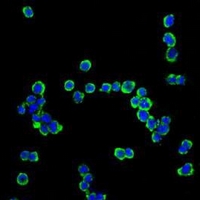Product Name :
CD138 monoclonal antibody Background :
Syndecans are a family of type 1 transmembrane heparan sulphate proteoglycans comprising four members in mammals encoded by four syndecan genes. Syndecans are involved in embryonic development, tumorigenesis, and angiogenesis. The extracellular domain harbors attachment sites for heparan sulfate and chondroitin sulfate chains, facilitating interaction with an array of proteins including a plethora of growth factors. In addition, the hydrophobic C-terminal intracellular domain can interact with proteins containing a PDZ domain. These interactions place syndecans as important integrators of membrane signaling. Syndecans undergo proteolytic cleavage causing the release of their extracellular domain , converting the membrane-bound proteins into soluble molecular effectors.Syndecan 1 is a specific marker for plasmacytic differentiation in hematologic disorders . This cell surface proteoglycan is also expressed in normal epithelial cells and tissues as well as various types of cancer tissues. The extracellular shed form of syndecan 1 remains soluble or accumulates in the extracellular matrix where it binds growth factors, cytokines and other extracellular matrix proteins. This binding activates signaling of bound growth factors or cytokines, which results in enhanced tumor growth, dissemination, angiogenesis, and osteolysis. As a result, the level of syndecan1 protein and its shed form may serve as prognostic factors for a list of malignancies. Product :
Mouse IgG1. Liquid in PBS, pH 7.3, 30% glycerol, and 0.01% sodium azide. Storage&Stability :
Store at 4°C short term. Aliquot and store at -20°C long term. Avoid freeze-thaw cycles. Specificity :
Recognizes endogenous levels of CD138 protein. Immunogen :
KLH-conjugated synthetic peptide of human CD138. The exact sequence is proprietary. Conjugate :
Unconjugated Modification :
Unmodification
CD138 monoclonal antibody Background :
Syndecans are a family of type 1 transmembrane heparan sulphate proteoglycans comprising four members in mammals encoded by four syndecan genes. Syndecans are involved in embryonic development, tumorigenesis, and angiogenesis. The extracellular domain harbors attachment sites for heparan sulfate and chondroitin sulfate chains, facilitating interaction with an array of proteins including a plethora of growth factors. In addition, the hydrophobic C-terminal intracellular domain can interact with proteins containing a PDZ domain. These interactions place syndecans as important integrators of membrane signaling. Syndecans undergo proteolytic cleavage causing the release of their extracellular domain , converting the membrane-bound proteins into soluble molecular effectors.Syndecan 1 is a specific marker for plasmacytic differentiation in hematologic disorders . This cell surface proteoglycan is also expressed in normal epithelial cells and tissues as well as various types of cancer tissues. The extracellular shed form of syndecan 1 remains soluble or accumulates in the extracellular matrix where it binds growth factors, cytokines and other extracellular matrix proteins. This binding activates signaling of bound growth factors or cytokines, which results in enhanced tumor growth, dissemination, angiogenesis, and osteolysis. As a result, the level of syndecan1 protein and its shed form may serve as prognostic factors for a list of malignancies. Product :
Mouse IgG1. Liquid in PBS, pH 7.3, 30% glycerol, and 0.01% sodium azide. Storage&Stability :
Store at 4°C short term. Aliquot and store at -20°C long term. Avoid freeze-thaw cycles. Specificity :
Recognizes endogenous levels of CD138 protein. Immunogen :
KLH-conjugated synthetic peptide of human CD138. The exact sequence is proprietary. Conjugate :
Unconjugated Modification :
Unmodification
-
 Western blot analysis of CD138 expression in Hela (A), HepG2 (B) whole cell lysates.
Western blot analysis of CD138 expression in Hela (A), HepG2 (B) whole cell lysates. -

Bioworld Biotech only provide peptides for our antibodies and do not provide additional peptide customization services.
Price/Size :
USD 368/1mg/vial
Tips:
For phospho antibody, we provide phospho peptide(0.5mg) and non-phospho peptide(0.5mg).Describe :
Blocking peptides are peptides that bind specifically to the target antibody and block antibody binding. These peptide usually contains the epitope recognized by the antibody. Antibodies bound to the blocking peptide no longer bind to the epitope on the target protein. This mechanism is useful when non-specific binding is an issue, for example, in Western blotting (WB) and Immunohistochemistry (IHC). By comparing the staining from the blocked antibody versus the antibody alone, one can see which staining is specific; Specific binding will be absent from the western blot or IHC performed with the neutralized antibody.Formula:
Synthetic peptide was lyophilized with 100% acetonitrile and is supplied as a powder. Reconstitute with 0.1 ml DI water for a final concentration of 10 mg/ml.The purity is >90%,tested by HPLC and MS.
Storage:
The freeze-dried powder is more stable. For short time at 2-8°C. For long term storage store at -20°C.
Note :
This product is for research use only (RUO only). Not for use in diagnostic or therapeutic procedures.
 CD138 monoclonal antibody
CD138 monoclonal antibody  Datasheet
Datasheet COA
COA MSDS
MSDS SHIP
SHIP